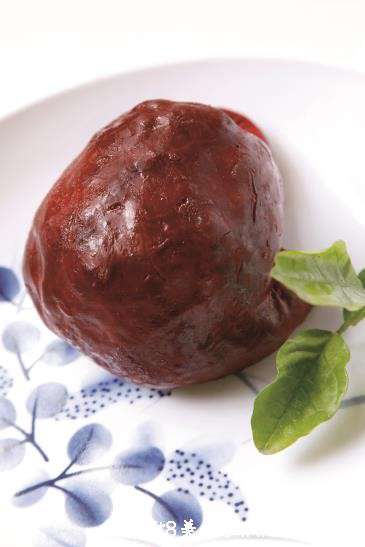樱桃是某些李属类植物的统称,包括樱桃亚属、酸樱桃亚属、桂樱亚属等。想知道樱桃的英文怎么说吗?那么现在跟着学习啦小编一起来学习关于樱桃的英语知识吧。

樱桃的英文释义
cherry ; prunus pseudocerasus ;
[电影]Cherries
网 络cherry;cherries;CHERR;About Cherry
樱桃的英文例句
樱桃树今年开花早。
The cherry trees blossomed early this year.
吃樱桃前要先把梗儿去掉。
Remove the stalks from the cherries before you eat them.
我们有不同的派,例如苹果、樱桃和草莓派。
We have different pies, such as apple, cherry, and strawberry pies.
樱桃树在早春开花。
Cherry trees flower in the early spring.
以新鲜的西印度樱桃果为原料,对西印度樱桃果汁饮料的加工工艺进行了探讨。
Some fresh acerola fruits were used to develop a new beverage.
黑樱桃酒用欧洲酸樱桃发酵的汁和压碎的核制成的一种香酒。
A cordial made from the fermented juice and crushed pits of the marasca cherry.
她洗了洗樱桃,给樱桃去了核。
She washed and stoned the cherry.
而它所在的北部半岛也被樱桃树和葡萄园所覆盖。
A peninsula is blanketed with cherry trees and vineyards.
你知道当时一共种植了多少棵樱桃树吗?
How many more cherry trees do you think were planted at that time?
The boy made a switch from the branch of a cherry tree. 这个男孩用樱桃树枝做了一条鞭子.
Seed the cherries before you put them in the pie. 樱桃去籽之后才能做馅饼.
Cherries vary in colour from almost black to yellow. 樱桃的颜色由近乎黑到黄各不相同.
The cabinet is made of cherry wood. 柜子是樱桃木做的.
Each cake had a cherry on top. 每块蛋糕上面都有一颗樱桃.
The cherry - trees began to put forth their blossoms. 樱桃树开始开花了.
The cherries are quite ripe. 樱桃熟透了.
Mark and Rick were the odd ones out in claiming to like this cherry beer. 只剩下马克和里克声称喜欢喝这种樱桃啤酒。
Apples, pears and cherries can be pruned back when they've lost their leaves. 苹果树、梨树和樱桃树在落叶后便可修剪。
Light filtered into my kitchen through the soft, green shade of the cherry tree. 光线透过樱桃树柔和的绿阴隐约照进我的厨房。
" Oh, yesterday, why, I had some cherries -- and all sorts of things. " “ 嗯, 昨天, 我吃了些樱桃, 还有各种各样的东西, ”
" The second is a cherry without any stone, " replied Sally. “ 第二件礼物是没有核的樱桃, ” 莎丽回答.
Where are the cherry and bird, the blanket and book? " 樱桃、鹅 、 毯子,还有书都在 哪里 ? ”
No , it isn't. it's a cherry pie. 不是. 它是樱桃饼.
" A cherry without any stone! " “ 没有核的樱桃! ”
I love cherries, but all cherries have stones. 我喜欢樱桃, 但是所有的樱桃都是有核的呀!
The bureau of cherry was also high and wide and solidly built. 那个樱桃木镜也做得又高又大,十分牢固.
That story about the cherry tree is supposed to be made up. 樱桃树的故事恐怕是人们杜撰的.
Given favourable conditions, this cherry tree will grow very rapidly. 如果给它适宜的条件, 这棵樱桃树会长得很快.
We have different pies, such as apple, cherry, and strawberry pies. 我们有不同的派, 例如苹果 、 樱桃和草莓派.
关于樱桃的英文阅读:樱桃树种子迁徙爬山熊功不可没
Picture a brave fireman carrying a pet from a burning building.
Now, imagine that global warming is the burning building, a cherry tree is the pet, and a bear is the fireman.
You've now got the gist of a new study that finds that cherry trees may be able to survive rising temperatures thanks to mountain-climbing bears that carry the cherry tree seeds to cooler climes.
It's projected that, over the next hundred years, temperatures on Earth could rise an average of nearly five degrees Celsius.
While some animals might be able to migrate north to escape the brunt of the heat, plants can't uproot themselves quite so easily.
But researchers wondered whether the creatures that disperse plant seeds might be able to help.
So scientists spent three years sifting through the droppings of Asiatic bears, looking for cherry tree seeds.
And they found that the bears were indeed transporting the seeds to cooler locations—not by moving to higher latitudes, but higher altitudes.
Seems the bears snack on the fruits that are found at the foot of the mountains in spring and then make the climb to higher elevations to enjoy young leaves and buds and flowers, particularly as the season progresses.
The researchers could tell that seeds had been deposited higher up the mountain than they had been harvested by the ratio of their oxygen isotopes, which changes with altitude.
And the 300 or so meters the seeds ascended should buy the resulting trees a degree or two in heat relief.
The study is in the journal Current Biology.
The finding is good news for plants, like cherry trees, that fruit in spring.
Unfortunately, the results suggest that plants that fruit in fall, when bears are headed back down for hibernation, will have to hold out for a different animal hero.
Or for a bear with a bad sense of direction.
想象一下一位奋不顾身的消防队员将一只宠物从熊熊大火建筑物中抢救出来的情景。
现在,想象下全球变暖就是着火的建筑物,樱桃树就是那只宠物,而熊就是这位英勇的消防员。
现在你肯定已经或多或少了解到这项新的研究,那就是得益于爬山熊将樱桃树的种子带到凉爽的地区,这种树木才可以在高温条件下存活。
预计未来的100年中,地表平均温度将上升5摄氏度。
而很多动物可能会前往北部地区躲避高温,但植物却不能够轻易搬家。
但研究人员认为如果动物能够传播植物的种子可能会起到帮助。
因此科学家们历时三年仔细寻找亚洲熊粪便中的樱桃树种。
而结果他们发现发现亚洲熊实际上将种子带到了更为凉爽的地方—不是前往高纬度地区,而是到了高海拔地区。
亚洲熊在春天会以山脚下的水果为食,而随着季节的推进,它们就会爬到更高处享用那里的嫩叶,花蕾及花朵。
通过研究氧同位素的比例,研究人员发现随着海拔的变化,种子所在地区的海拔会升高。
种子所在地区的海拔每增加300米左右,温度就会降低1-2度。
这项研究已经在《当代生物学》杂志上发表。
这一发现对樱桃树等春天结果的植物是个利好消息。
但不幸的是,这项研究表明由于亚洲熊们已经去冬眠,因此秋天结果的植物就只能期待另外的救星。
或者是依赖一只方向感不太好的熊。
